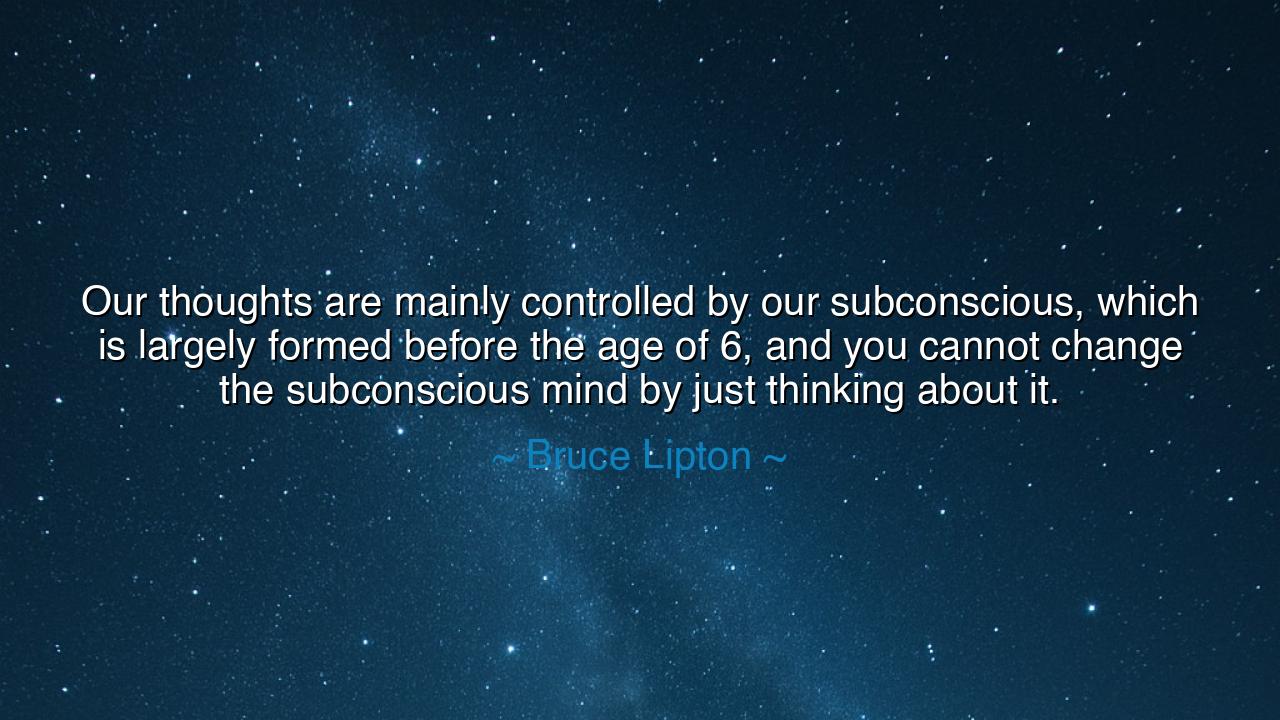
Our thoughts are mainly controlled by our subconscious, which is
Our thoughts are mainly controlled by our subconscious, which is largely formed before the age of 6, and you cannot change the subconscious mind by just thinking about it.






"Our thoughts are mainly controlled by our subconscious, which is largely formed before the age of 6, and you cannot change the subconscious mind by just thinking about it." These profound words spoken by Bruce Lipton reveal a timeless truth about the nature of the mind, the forces that shape our thoughts, and the unseen patterns that govern our lives. The subconscious mind, formed in the earliest years of life, holds sway over much of what we think, feel, and do, and it is often not until we understand its depths that we can hope to break free from its control. Lipton’s statement calls us to reflect on the power of early experiences and the enduring impact they have on the course of our lives, showing us that merely thinking about change is not enough to break the bonds of the past.
In the ancient world, wisdom about the nature of the mind and its workings was often passed down through stories and philosophies. Consider the teachings of Socrates, who believed that true knowledge comes not from external sources, but from deep self-examination. The Greeks understood that the soul, like the mind, could be shaped and molded over time. The ancient Egyptians, too, believed that the heart—the seat of emotions and thought—was central to personal identity and destiny. They saw the heart as both the source of wisdom and a repository for the experiences of life. Much like the subconscious, these ancient teachings pointed to the idea that our innermost selves are deeply influenced by the experiences we have early in life, and they shape who we become.
Yet, even more than these ancient philosophers, Lipton’s words reveal the critical importance of the early years of life. The influence of our subconscious mind begins long before we are capable of rational thought—a truth that echoes through the teachings of ancient cultures. Take, for example, the story of King Tutankhamun. Though he ascended to the throne as a young child, the way he ruled and the decisions he made were influenced not just by his own knowledge, but by the influences of those who guided him, shaping his subconscious and, ultimately, the future of Egypt. His early experiences with power, leadership, and governance—though external—became deeply ingrained in his subconscious, guiding the course of his reign.
The idea that the subconscious is formed before the age of six also calls to mind the ancient practice of initiation. In many cultures, young children were given guidance, lessons, and rituals that shaped the way they viewed the world and their place in it. Whether through rite of passage ceremonies or simple familial teachings, the subconscious mind was molded early in life. This foundation, set long before the child could articulate thoughts or consciously reflect on them, became the lens through which the individual viewed all of existence. Lipton’s words remind us that the early years are not just about education, but about the formation of our innermost patterns, our beliefs, and our habitual ways of thinking.
Lipton’s assertion that we cannot simply change the subconscious mind by thinking about it highlights the power of habit and pattern. It is a deeply embedded truth that echoes the ancient wisdom of the Stoics, particularly Epictetus, who taught that while we cannot always control the external world, we have power over our internal responses. However, even the Stoics knew that changing the way we react to the world takes time and practice. Just as a craftsman must shape stone over years of work, so too must we cultivate new ways of thinking, especially when we face the long-lasting effects of our early experiences. Change, true change, requires more than just thinking—it requires action, reflection, and, above all, commitment.
A real-life example of this principle can be seen in the life of Nelson Mandela, who spent 27 years in prison, but whose mindset was not shaped by bitterness or anger despite his suffering. Though Mandela’s early experiences of injustice and oppression certainly shaped him, he did not let these experiences govern his life. Through his introspection, his commitment to forgiveness, and his effort to break the cycles of hatred that had been passed down to him, Mandela became a figure who transcended the subconscious patterns of anger and division. His transformation is a testament to the power of conscious effort to reshape the mind and break free from the patterns that hold us back.
The lesson in Lipton’s words is profound: while our subconscious mind is shaped early in life and often acts as the lens through which we perceive the world, we are not forever bound to its influence. True change requires not just thinking, but deep reflection and action. If we are to break free from the patterns instilled in us early, we must first understand them, then work consciously to cultivate new beliefs and habits. This is not a simple task, but one that requires dedication and persistence, just as the ancients practiced their arts, crafts, and philosophies over lifetimes of committed effort.
In practical terms, this means that we must become aware of the ways our early experiences have shaped us, and actively work to change those patterns that no longer serve us. Whether through meditation, therapy, or self-examination, we must make the subconscious conscious and take steps to reprogram the mind. Like the Stoics and Mandela, we can work not to let our past define us, but instead use our understanding of it to transform our future. Let us remember that while our subconscious may hold the keys to our past, it is our conscious effort and will that can unlock the potential for growth and change in the present.






AAdministratorAdministrator
Welcome, honored guests. Please leave a comment, we will respond soon